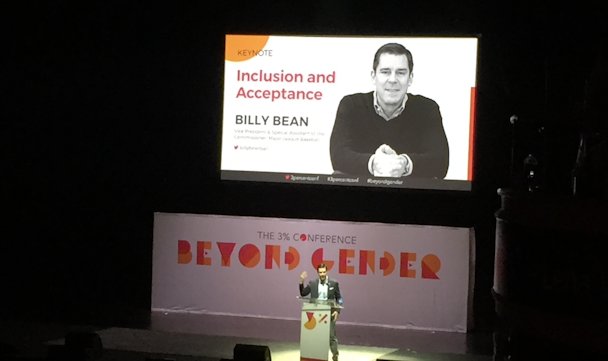Billy Bean talks changing the conversation in sports to one of inclusion and acceptance
With the exciting World Series still fresh on the minds of baseball fans, a former Major League Baseball player talked about his struggles, not in the game but coming out as a gay man after he left baseball, at the 3% Conference in New York.

MLB's Billy Bean speaks at the 3% Conference about inclusion in baseball
Now, as the sport’s ambassador of inclusion, Billy Bean is helping to steer the conversation about diversity and inclusion for a league worth billions and one tied to millions of advertising and marketing dollars across the US and worldwide.
Bean was a good baseball player for several major league teams from 1987 to 1995, but during his playing days, he realized he wasn’t living honestly with himself. A video interview with Diane Sawyer played before Bean took the stage showed that his career was on the upswing, he was married and “everything on the outside looked great” he said in the video.
Then in 1993, his double life began. He met a man who would become his partner, but he hid him from the world because of the machismo in baseball, and his shame from his strict Catholic upbringing. He got divorced and kept his gay life a secret.
When his partner became ill and died in 1995 from HIV-related causes, Bean retreated from his family, his friends and the game of baseball, ultimately walking away in 1996.
His story is no secret, but hearing it directly from a man who finally, after over two decades away from his playing days, feels at home as himself was inspiring, and also a lesson for those who may have heard of him for the first time and didn’t know he is still the only living openly gay Major League Baseball player.
Bean found the game again reluctantly. He moved to Miami and tried to live a quiet life, but after opening a restaurant, a journalist encouraged him to tell his story. After coming out to his mother, and eventually to an accepting father, he was thrust into the news, first in the Miami Herald, then on the front page of the New York Times, then with the Diane Sawyer interview in 1999.
“She did a story that changed my life overnight,” said Bean, who still didn’t know how to deal with this different type of fame back then. “There were zero role models, especially male role models,” he said, noting that Billie Jean King and Martina Navratilova had paved the way in sports, but no males had come out.
But Bean also felt shame, since he had kept his secret for so long. “I was not familiar with my own community. In fact, I had disrespected it and lied about it,” he said.
But he slowly embraced who he was, spurred on by “two women I had never met.” One was Elizabeth Birch, then the executive director of the Human Rights Campaign, who flew him to Washington, DC to meet with high-level advocates of the movement. There, he sat next to Judy Shepard, the mother of Matthew Shepard, a teen who was beaten to death in a hate crime so heinous it was the basis for hate crime legislation in the US.
“Her son came out to her when he was 10 years old...I looked at her and was overcome with shame. She was trying to make a difference...but she said ‘Billy, you have a chance to change the dialogue…Matthew loved baseball. You would have been a hero to him'.”
An ambassador for change and acceptance
After over a decade away from the game, baseball came back to him, this time as a voice for change. He started speaking to groups about his struggles, his acceptance of himself and he became a voice for those in sports who didn’t have one.
In 2014, he was named Major League Baseball’s first-ever Ambassador for Inclusion. It’s a role he doesn’t take lightly and one he hopes will lead to more acceptance.

“The experience that I have is that the day I stopped lying about myself was when light started to shine on my life. You have to be vocal,” he said.
In his role, Bean talks with players and teams – he notes on a volunteer basis, as he doesn’t want it to be mandatory – to bring awareness to players, coaches, managers, umpires and employees about diversity and the LGBT community. He also focuses of social responsibility and making an equitable, inclusive, supportive workplace.
Bean admits he has a long way to go, as baseball and other sports are still dominated by a patriarchal nature. He sees that sexism is wrapped inside homophobia, and that a gay man in sports is still shunned in many places. But he is determined to make a difference.
“Get involved. Speak up for yourself,” he said, noting that he doesn’t want to see someone else have to live the lies he lived.
“We stumble, we fall, we have setbacks, but the effort is there,” he said. One of those efforts is an anti-bullying campaign he is implementing called ‘Shred Hate,’ which he hopes will be implemented in all 30 Major League markets within a decade. Another is the Trailblazer Series, an all-girls baseball tournament sponsored by MLB.
As for changing the conversation in the big leagues, Bean says he tries to find relatable conversations, which he admits is difficult. One thing he does is challenge those players who are parents to think of the kind of conversations that are going to be at their dinner tables. “What kind of kid do you want to raise – a bully or a great kid that brings people together?”
He noted that in a polarized country with so much negativity and with many detractors, he sometimes feels he’s backsliding in his job, but he’ll keep fighting for what is right, even if it took him a long time to come to grips with himself.
“I want to make a difference off field that I didn’t do when I was on the field,” he said.
Wunderman proudly supports The Drum’s 3% Conference coverage. We believe true diversity does not check boxes, it checks itself. http://wunderman.com/


